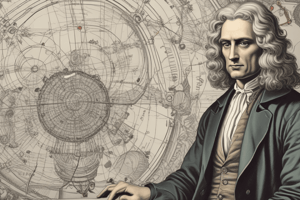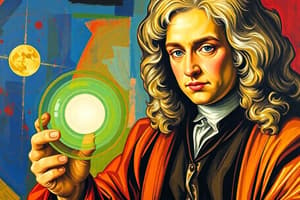Podcast
Questions and Answers
What was the title of Sir Isaac Newton's book that established classical mechanics?
What was the title of Sir Isaac Newton's book that established classical mechanics?
- Arithmetica Universalis
- Opticks
- Principia Mathematica
- Philosophiæ Naturalis Principia Mathematica (correct)
What did Newton formulate in the Principia?
What did Newton formulate in the Principia?
- The laws of thermodynamics
- The laws of motion and universal gravitation (correct)
- The laws of optics
- The laws of electricity and magnetism
What was Newton's theory of colour?
What was Newton's theory of colour?
- Colour is a property of the human eye
- Colour is a reflection of objects
- Colour is a combination of light and dark
- Colour is a property intrinsic to light (correct)
What did Newton argue about light?
What did Newton argue about light?
What did Newton use to explain the repeated pattern of reflection and transmission by thin films?
What did Newton use to explain the repeated pattern of reflection and transmission by thin films?
What was the dispute between Newton and Leibniz about?
What was the dispute between Newton and Leibniz about?
What did Newton's theory of gravity rely on?
What did Newton's theory of gravity rely on?
What did Newton use to determine the orbits of comets?
What did Newton use to determine the orbits of comets?
What was the SI derived unit of force named after?
What was the SI derived unit of force named after?
Flashcards are hidden until you start studying
Study Notes
The Life and Work of Sir Isaac Newton
-
Sir Isaac Newton was an English mathematician, physicist, astronomer, alchemist, theologian, and author who lived from 1642 to 1727.
-
He was a key figure in the Scientific Revolution and the Enlightenment, and his pioneering book Philosophiæ Naturalis Principia Mathematica (Mathematical Principles of Natural Philosophy) established classical mechanics.
-
Newton also made seminal contributions to optics, including developing a theory of colour and building the first practical reflecting telescope, and he shares credit with German mathematician Gottfried Wilhelm Leibniz for developing infinitesimal calculus.
-
In the Principia, Newton formulated the laws of motion and universal gravitation that formed the dominant scientific viewpoint for centuries until it was superseded by the theory of relativity.
-
Newton's work on gravity allowed him to derive Kepler's laws of planetary motion, account for tides, the trajectories of comets, the precession of the equinoxes and other phenomena, eradicating doubt about the Solar System's heliocentricity.
-
Newton was a fellow of Trinity College and the second Lucasian Professor of Mathematics at the University of Cambridge, and he was a devout but unorthodox Christian who privately rejected the doctrine of the Trinity.
-
Beyond his work on the mathematical sciences, Newton dedicated much of his time to the study of alchemy and biblical chronology, but most of his work in those areas remained unpublished until long after his death.
-
Newton's work on calculus included discovering the generalised binomial theorem, developing a mathematical theory that later became calculus, and using methods involving "one or more orders of the infinitesimally small".
-
Newton's work on optics included demonstrating that colour is a property intrinsic to light and constructing the first known functional reflecting telescope.
-
Newton argued that light is composed of particles or corpuscles, which were refracted by accelerating into a denser medium, and he also used soundlike waves to explain the repeated pattern of reflection and transmission by thin films.
-
Newton was involved in a dispute with Leibniz over priority in the development of calculus, and the dispute broke out in full force in 1711 when the Royal Society proclaimed in a study that it was Newton who was the true discoverer.
-
Newton's academic work impressed the Lucasian professor Isaac Barrow, who was anxious to develop his own religious and administrative potential, and in 1669, Newton succeeded him as Lucasian Professor of Mathematics.
-
Newton argued that the Lucasian professorship should exempt him from the ordination requirement, and Charles II accepted this argument, thus averting a conflict between Newton's religious views and Anglican orthodoxy.Summary Title: The Life and Contributions of Sir Isaac Newton
-
Newton's understanding of light involved the existence of the ether and occult forces based on Hermetic ideas of attraction and repulsion between particles.
-
Newton's interest in alchemy cannot be isolated from his contributions to science, and his theory of gravity relied on the occult idea of action at a distance.
-
In his book Opticks, Newton expounded his corpuscular theory of light and constructed a primitive form of a frictional electrostatic generator.
-
Newton was the first to show a diagram using a prism as a beam expander and the use of multiple-prism arrays, which led to the development of narrow-linewidth tunable lasers and the multiple-prism dispersion theory.
-
Young and Fresnel discarded Newton's particle theory in favour of Huygens' wave theory to show that colour is the visible manifestation of light's wavelength.
-
In the Principia, Newton stated the three universal laws of motion, which laid the foundation for classical mechanics and contributed to many advances during the Industrial Revolution.
-
Newton used the Latin word gravitas for the effect that would become known as gravity and defined the law of universal gravitation.
-
Newton presented a calculus-like method of geometrical analysis using 'first and last ratios', and provided a theory for the determination of the orbits of comets, among other contributions in the Principia.
-
Newton was made president of the Royal Society and an associate of the French Académie des Sciences, but he made an enemy of John Flamsteed, the Astronomer Royal, by prematurely publishing Flamsteed's Historia Coelestis Britannica.
-
Newton was knighted in 1705 and took up the post of warden of the Royal Mint in 1696, where he exercised his authority to reform the currency and punish clippers and counterfeiters.
-
Newton died in his sleep in London in 1727 and was given a ceremonial funeral, attended by nobles, scientists, and philosophers, and was buried in Westminster Abbey among kings and queens.
-
Newton never married and had a close friendship with the Swiss mathematician Nicolas Fatio de Duillier, but their relationship came to an abrupt and unexplained end in 1693, and at the same time Newton suffered a nervous breakdown.Isaac Newton was a complex figure, known for his contributions to science, theology, and alchemy. While his laws of motion and universal gravitation are his most famous discoveries, he also had an extensive knowledge of early Church writings and held a Christian faith that was considered heretical by mainstream Christianity. He believed in a world that could be understood by an active reason and saw evidence of design in the system of the world. Newton's work on alchemy, which makes up about one million words of his writings, is often overlooked. Newton was inspired to formulate his theory of gravitation by watching the fall of an apple from a tree. His monument in Westminster Abbey features a figure of Newton reclining on top of a sarcophagus and a relief panel depicts putti using instruments such as a telescope and prism. The SI derived unit of force is named the newton in his honour.Isaac Newton: His Life and Impact
-
Isaac Newton was born in 1642 in Woolsthorpe, England and died in 1727 in London, England.
-
Newton attended Trinity College, Cambridge and is known for his work on calculus, optics, and the laws of motion.
-
In 1687, Newton published the Philosophiæ Naturalis Principia Mathematica, which describes the laws of motion and gravity.
-
Newton's work on light and color led to the development of the reflecting telescope and paved the way for modern optics.
-
Newton served as Master of the Mint in England and was elected president of the Royal Society in 1703.
-
Newton's contributions to mathematics and science had a profound impact on the Enlightenment and the development of modern physics.
-
The still-standing farmhouse at Woolsthorpe By Colsterworth is a Grade I listed building and is considered to be the place where Newton discovered gravity.
-
Newton's statue can be found in various locations including Grantham Guildhall and the British Library in London.
-
European philosophers of the Enlightenment saw Newton's publication of the Principia as a turning point in the Scientific Revolution and the start of the Enlightenment.
-
Newton's work on natural and rationally understandable laws led to the development of Enlightenment ideology and influenced various fields including politics, economics, and sociology.
-
Newton's published works include the Principia, Opticks, and Arithmetica Universalis.
-
Newton's unpublished works include his theological and alchemical writings.
-
Newton's religious beliefs were complex and he spent significant time studying the Bible and the writings of early Christian theologians.
Studying That Suits You
Use AI to generate personalized quizzes and flashcards to suit your learning preferences.




